Sharón Benheim has dedicated years to the study, practice and facilitation of conflict resolution, consensus building, and mediation among people of diverse cultures across the Middle East region. Her current work involves coordinating an Israeli team in a trilateral, international research project examining reconciliation and conflict resolution.
QLF Experiences
Fellowship for Middle East Conservation Leaders to New England, 2006
Capacity and Consensus Building Workshop, Jordan, 2008
Sharón began her work in conflict resolution during an internship at the Center for International Development and Conflict Management in Maryland. She observed that it is “difficult to visualize how major conflicts translate on a personal level; this internship gave a taste of that,” which she found fascinating. Shortly thereafter, she moved to Israel — where her parents are from — and began working on projects geared towards bringing together Arabs and Jews from Israel and the surrounding countries. Sharón also worked as an administrator at the Arava Institute for Environmental Studies, which connects Arab and Jewish Middle Eastern interns and students (as well as others from around the world) from a variety of backgrounds to address environmental issues. There she directed Arava’s Alumni Projects and created the Arava Alumni Peace and Environment Network.
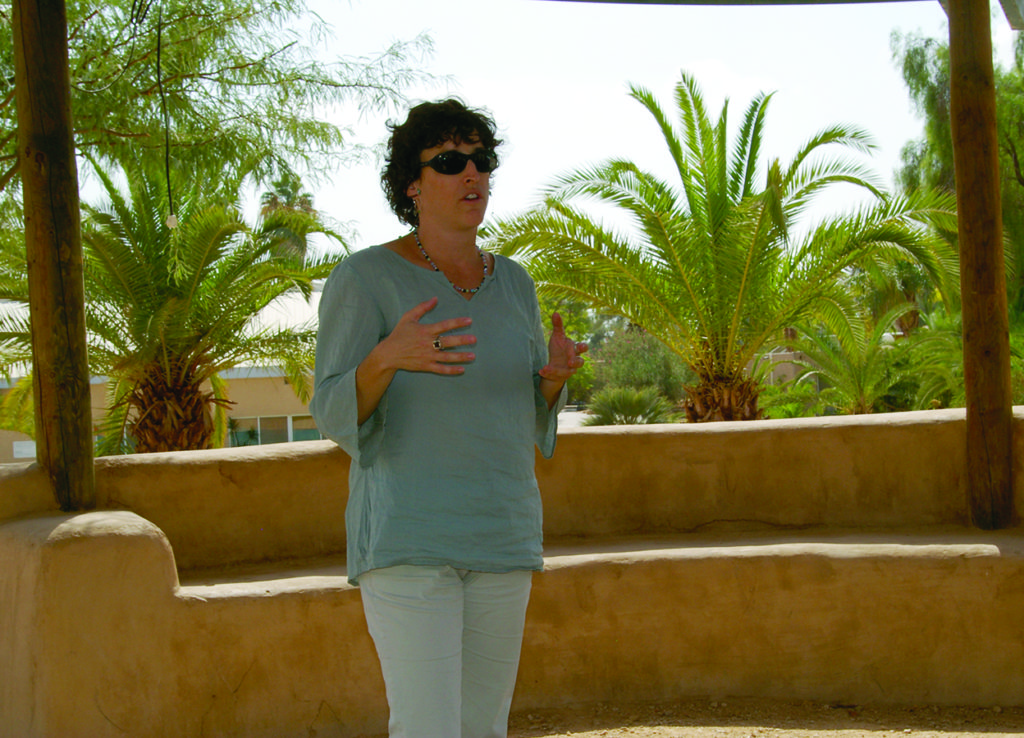
Fellowship to the Middle East (2007). Sharón Benheim (Israel) talks with the North American Fellows about life on a kibbutz, Kibbutz Ketura, Arava Valley, southern Israel.
In her time working at the Arava Institute, Sharón frequently sent students and interns to participate in QLF programs. When she saw a QLF advertisement for an exchange program titled Developing Approaches to Preventing and Mitigating Community Conflict, she was intrigued. At the time, Sharón was enrolled in a mediation certification program at Ben Gurion University, so a QLF program focused on conflict and communities was well suited to her interests and work. Sharón applied and was accepted as a program Fellow.
In recalling her time at QLF, Sharón shares story after story of how the Fellows found common ground and bonded over shared experiences. She remembers the owner of their bed and breakfast joking that none of his guests would eat bacon, between those who were vegetarian, Muslim, or Jewish. And, she reminisces about all eleven Fellows singing songs together on a long drive. Finding songs that they all knew meant alternating between singing in Hebrew and Arabic.
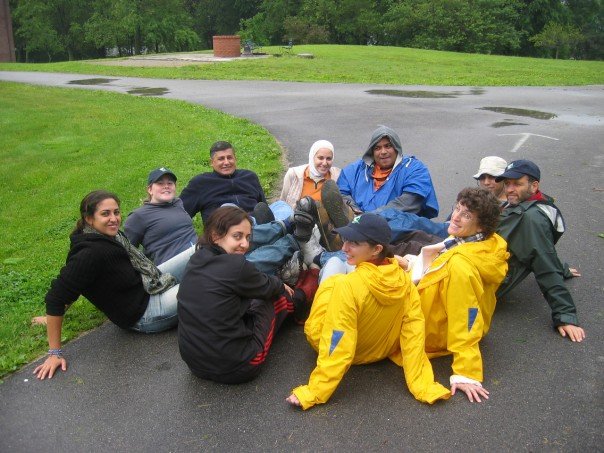
Sharón and the other 2006 QLF Middle Eastern Fellows on Thompson’s Island participating in an Outward Bound program. (Sharón is in yellow, on the right.)
As an observant Jew, Sharón celebrates the Sabbath, and so, one Friday, she slept at a different location from the rest of the group so that she would be within walking distance of the workshop the next day. Not wanting to leave her alone, a Jordanian research Fellow offered to stay at the same location to keep her company. Although he did not know how Jews keep the Sabbath, he accepted that this was something Sharón had to do to enable her to participate, and took it upon himself to offer his support. The QLF program fostered a strong sense of community and friendship among Fellows from different backgrounds.
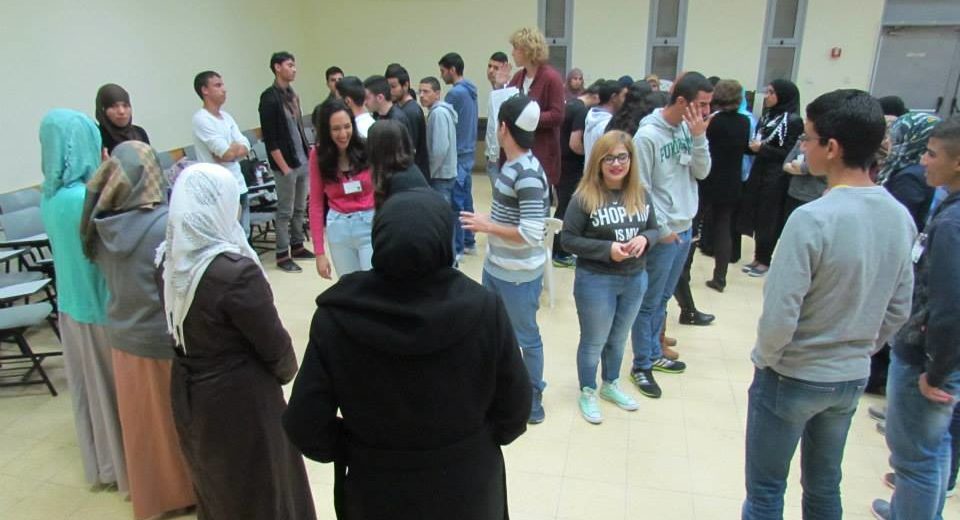
Sharón stands on a chair in the center of a circle of students, leading an introductory game at a Young Negotiators Training seminar with Arab and Jewish Israeli high school students.
Participating in the QLF Fellowship played a large part in Sharón’s decision to return to school and ultimately become a researcher. Today, she is the Logistics Coordinator of the Martin Springer Center for Conflict Studies at Ben Gurion University of the Negev. In addition, she coordinates the Israeli portion of a trilateral project involving researchers in Germany, the Palestinian authority, and Israel. The project examines whether groups in conflict become more willing to reconcile if they are educated about the historical suffering of the opposing group. Before tackling this project, Sharón pursued conflict resolution for twenty years, driven by the instinct that bringing opposing parties together could increase their willingness to devise collaborative solutions. “When you know real people on the other side,” she explains, “you think in more layers of complexity and therefore you have a richer set of options for how to solve a problem.” Through her work with Arava and QLF, Sharón realized that important Israeli-Palestinian mediation programs exist, but no scientific research had yet validated this approach. In order to generate support for these projects, Sharón decided to pursue scientific research as a means of demonstrating their effectiveness.
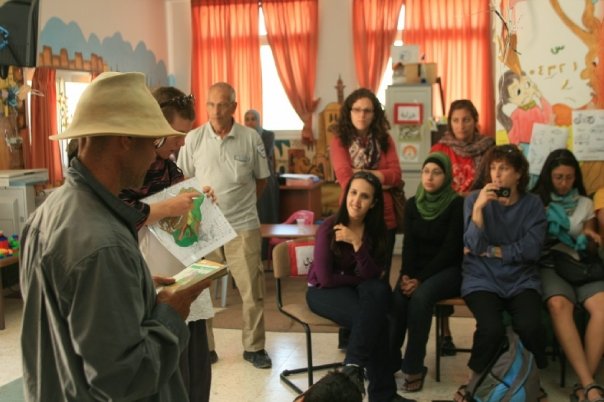
Sharón and the other 2006 QLF Middle Eastern Fellows on Thompson’s Island participating in an Outward Bound program. (Bottom row, second from the right.)
Not only did her QLF experiences motivate Sharón to pursue research, but the principles embraced in QLF workshops also influenced her work. The workshops follow a bottom-up approach, emphasizing that conservation projects must stem directly from community members. We learned how, as researchers, activists, and educators, we could empower communities by providing the tools to find the best solutions to their conflicts, Sharón writes. And we learned that only by working with the people in the communities, with patience and an open mind to hear directly from the people, would we have a chance at building practical solutions. Sharón adopts this community-based approach in her work today.
In reflecting on her career trajectory, Sharón shares a few words of appreciation for QLF: “A word of thanks…[for] the fact that [QLF is] willing to connect people as equals and help share information. The fact that it wasn’t treated as, ‘these people from developing countries, they have to come over to America to learn what we know,’ but rather as an equal exchange… I am thankful for the fact that that is in fact the approach of the organization and that they really are all about how to empower people, inspire people… And that is not something that you can take for granted. It is very much appreciated.”
For more information about the Arava Institute and the Martin Springer Centre, please visit arava.org and www.bgu.ac.il/mscs.
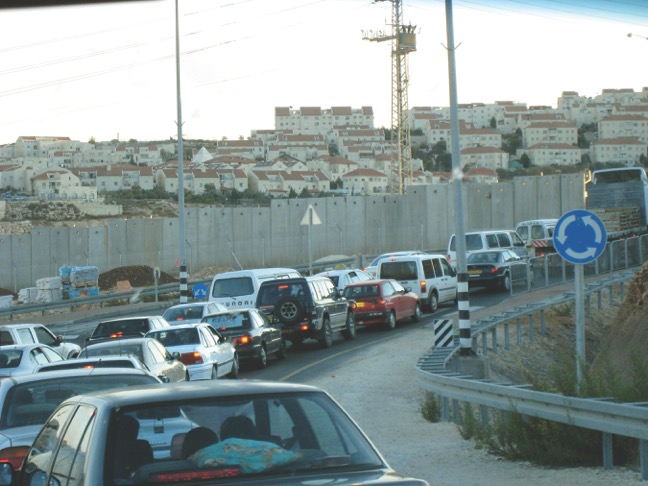
The Israeli-West Bank Separation Wall, West Bank, Palestine. In the background is the Israeli settlement of Giva’at Zae’ev (2007).






